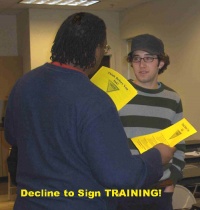Missouri Civil Rights Initiative (2008)
| Not on Ballot |
|---|

|
| This measure did not appear on a ballot. |
The Missouri Civil Rights Initiative, also known as Missouri Ballot Measure 009, was proposed as an initiative for the November 2008 general election ballot in Missouri. Proponents of the measure failed to submit sufficient signatures by the deadline, so it did not appear on the November ballot.[1]
Proponent Ward Connerly said he would not give up on the initiative and would try again in 2010.
If enacted, it would have added a new constitutional amendment to the Missouri Constitution, prohibiting the state from discriminating on the basis of race. Opponents described the measure as anti-affirmative action, and supporters described it as banning racial preferences.[2]
A version of the initiative had already been passed in Michigan, California and Washington.
Text of proposed amendment
"Shall the Missouri Constitution be amended to prohibit any form of discrimination as an act of the state by declaring: The state shall not discriminate against, or grant preferential treatment to, any individual or group on the basis of race, sex, color, ethnicity or national origin in the operation of public employment, public education or public contracting?"
Fiscal impact
The initiative and referendum regulations in Missouri require the Missouri Secretary of State to release a fiscal statement about each proposed ballot initiative prior to circulation of the petition, estimating how much money the measure would cost the state if enacted. The fiscal statement for this initiative read as follows:[3]
| “ | The total cost or savings to state and local governmental entities is unknown. Most state governmental entities estimate no costs or savings, however, costs or savings related to future contracts are unknown. Some local governments estimate no costs or savings, but prohibition of certain municipal policies may result in unknown costs.[4] | ” |
Controversy over ballot title
In Missouri, the Missouri Secretary of State is to determine a ballot title for each proposed initiative after the initiative's proponents submit their language to that office, and before the initiative starts circulating for signatures.
The ballot title written by secretary of state Robin Carnahan read as follows:
| “ | Shall the Missouri Constitution be amended to:
|
” |
Successful lawsuit against Carnahan's ballot title
The sponsors of the Missouri Civil Rights Initiative (MoCRI) subsequently filed a lawsuit against the Missouri Secretary of State for changing the language to read as follows:[5]
| “ | [Ban] affirmative action programs designed to eliminate discrimination against, and improve opportunities for women and minorities.[4] | ” |
Jay MacManus in the Missouri Attorney General's office defended Carnahan's change, saying, "I believe people looking at this would conclude that, in fact, it does capture the essence of what this amendment is all about there is no deception here, people will know what this is about. It's about Affirmative Action."[sic][6]
However, on January 7, 2008, Judge Richard Callahan ruled that the ballot title prepared by Carnahan was "insufficient and unfair." Judge Callahan also rejected a challenge to the initiative's fiscal impact statement by opponents of the initiative. Carnahan vowed to appeal Callahan's ruling.[7] Carnahan won a similar appeal on May 2, 2008, but the appeal of Judge Callahan's decision was dismissed as moot since no signatures were turned in.
As a result of the ruling, paid and volunteer canvassers began soliciting signatures from registered voters.[8]
Constitutionality deferred
In the same lawsuit, the judge ruled that a constitutional challenge to the initiative was premature.
Alleged petition blocking
Ward Connerly accused Lee Albright of National Petition Management of leading a petition blocking effort against the initiative. Albright denied the charge, saying that, to the best of his knowledge, the blocking effort was managed by Missouri ACORN. Connerly also accused the ACLU, ACORN, BISC, and the NAACP of being involved in the blocking.[9]
Reported tactics to intimidate potential signers included intimidation, screaming and stealing petitions. As a result, the Missouri Civil Rights Initiative group placed ads in an effort to hire more petition circulators.[9] These blockers were also alleged to follow circulators, scream that the initiative was racist and that it had the support of the Ku Klux Klan. They reportedly threatened that signing to support the measure risked identity theft. In addition, the blockers allegedly dispatched their people to sign petitions with false names and addresses, so that they would be invalidated later, effectively committing ballot fraud.[10]
Proponents
The measure was sponsored by the American Civil Rights Initiative, a national organization established in 1996 by Ward Connerly and Dusty Rhodes.
The American Civil Rights Initiative supported similar measures in other states in 2008, including Arizona, Colorado, Oklahoma and Nebraska. The combined effort was known as Super Tuesday for Equal Rights.[11]
According to news accounts, the Missouri Civil Rights Initiative (MoCRI) advocacy group was leading the campaign. MoCRI's executive director, Tim Asher, was the official sponsor of the initiative. John Uhlmann served as the honorary chair and Ward Connerly, chairman of the American Civil Rights Coalition, was a mentor to the group.[12]
Asher toured the state, speaking at the capital on "Hispanic Day" to promote the initiative. He reportedly met significant resistance.[13]
Ward Connerly conducted a presentation at the University of Missouri.[14]
Connerly reportedly raised $160,000 for the MoCRI initiative, most of which came from his "Super Tuesday" fund. The money was to help pay for more circulators from National Ballot Access.[13]
Opponents
"Jobs for Justice" launched a "decline to sign" petition-blocking campaign, including training sessions. On February 2, 2008, the Kansas City Star wrote an editorial saying that when the state's voters went to the polls to vote in the February 5, 2008, presidential primary, they might be asked by a petition circulator to sign the petition and, if so, they should "skip this petition."
Church groups
Missouri Episcopalians and the Diocese of Missouri joined with a broad coalition of faith-based organizations to oppose the initiative.[15]
Counter initiative
Another group opposing the initiative was "Working to Empower Community Action Now," or "WeCAN." The group sent volunteers into the streets during February's primary to encourage voters not to sign the petition. One volunteer, Rodney Lovings, was quoted in the St. Louis Post-Dispatch telling a voter, "It's not good for St. Louis. It's not good for Missouri. Think before you ink." The group reportedly trained 90 petition blockers to canvass the St. Louis area and search for circulators to dissuade citizens from signing it. The group also reportedly hired local workers through the Association of Community Organizations for Reform Now to do the same work.[16]
The group reportedly raised $77,500 in funds to fight the initiative.[13]
As the petition supporters were reportedly preparing to start gathering signatures, opponents were reportedly meeting to form their own commission to discourage voters from signing.[17]
Universities
Students at Missouri University reportedly arranged a "Missing Minority Campaign" to combat the initiative. Its following was more scattered than had been predicted, with some students supporting sponsors of the initiative. The minority campaign had reportedly recruited students, faculty and staff of all ethnicities.[18] The group arranged a campus protest that amounted to an estimated 100 participants.[19]
External links
- 2008 Initiative petitions approved for circulation in Missouri
- Full text of proposed amendment
- Missouri Civil Rights Initiative
- Race Blind (a blog about all four "Super Tuesday" civil rights initiatives)
- Adversity.net
- WE CAN organization
See also
- Missouri 2008 ballot measures
- Missouri 2008 citizen initiatives
- Affirmative action in Missouri
- Campaign finance requirements for Missouri ballot measures
- Missouri signature requirements
- Petition drive deadlines in 2008
Other 2008 civil rights measures
- Arizona Civil Rights Initiative (2008)
- Colorado Civil Rights Initiative (2008)
- Nebraska Civil Rights Initiative, 424 (2008)
- Oklahoma State Question No. 737 (2008)
Footnotes
- ↑ Kansas City Star, "Group fails to get enough signatures for anti-affirmative action amendment," May 4, 2008
- ↑ St. Louis Tribune, "Missouri a target of group opposing racial preferences," June 28, 2007
- ↑ Missouri Secretary of State, "2008 Initiative Petitions," accessed December 16, 2015
- ↑ 4.0 4.1 4.2 Note: This text is quoted verbatim from the original source. Any inconsistencies are attributable to the original source.
- ↑ [http://findarticles.com/p/articles/mi_qn4185/is_20070823/ai_n19491627 St. Louis Daily Record, "Amendment backer sues over ballot language," August 23, 2007
- ↑ BIA Radio, "Anti-Affirmative Action Group Sues Over Wording of Ballot Initiative," December 18, 2007
- ↑ [http://primebuzz.kcstar.com/?q=node/9274 Associated Press, "Judge rewrites Mo. ballot language on affirmative action," January 7, 2008
- ↑ Prime Buzz, "Judge rewrites Mo. ballot language on affirmative action," January 7, 2008
- ↑ 9.0 9.1 National Review Online, "Civil Rights Struggle," April 11, 2008
- ↑ Wall Street Journal, "Super Tuesday for Equal Rights," April 23, 2008
- ↑ Chronicle of Higher Education, "Four states are new targets for bans on affirmative action preferences," April 23, 2007
- ↑ Missouri Civil Rights Initiative, "About MoCRI," accessed December 17, 2015
- ↑ 13.0 13.1 13.2 St. Louis Today, "A boy-next-door is fighting affirmative action," April 27, 2008
- ↑ Associated Press, "Anti-affirmative Action Activist Ward Connerly Comes to Missouri," October 22, 2007
- ↑ Episcopal Life Online, "Diocese opposes so-called Civil Rights initiative," February 28, 2008
- ↑ People's World, "News Analysis: Missourians triumph over anti-civil rights plan," May 23, 2008
- ↑ St. Louis Today, "Opponents of affirmative action initiative host hearing," February 12, 2008
- ↑ KOMU News, "Affirmative Action Debate," April 14, 2008
- ↑ Columbia Missourian, "Civil Rights Initiative protest moves through MU campus," April 15, 2008




